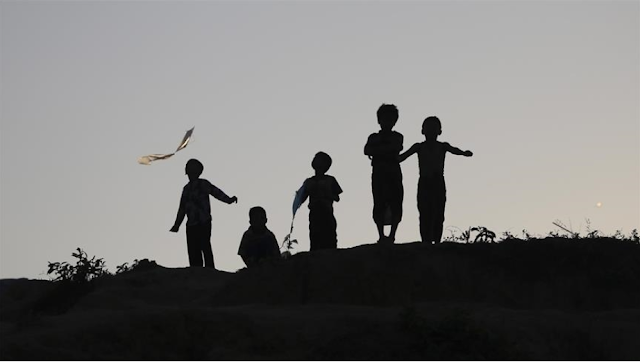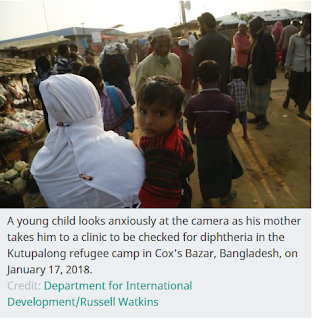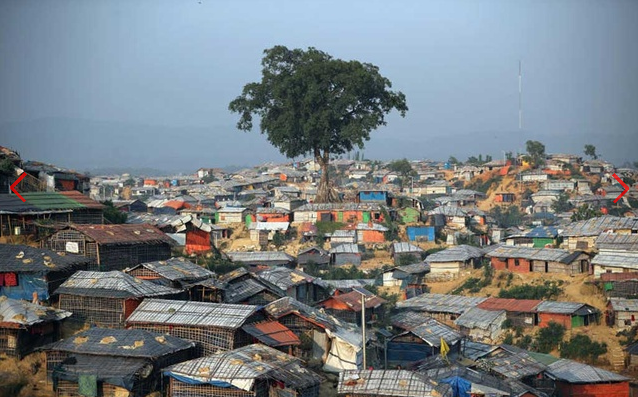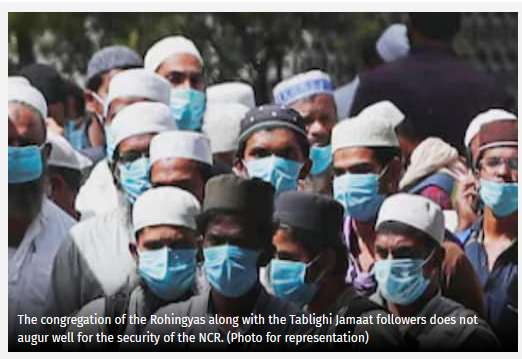Monday, October 18, 2021
U.N deal offers no guarantees of free movement for Rohingya on island - leaked agreement
Friday, October 15, 2021
Thursday, October 14, 2021
After Killing, Bangladesh Launches Crackdown in Rohingya Camps
October 14, 2021
“Police so far arrested 38 Rohingya from different refugee camps since the murder of Muhib Ullah,” Rafiqul Islam, an additional police superintendent in Cox’s Bazar, told BenarNews on Tuesday. “Law enforcers are continuing the drives to reduce any offenses or illegal activities in refugee camps.”
According to the officials, five of the suspects were arrested in connection with the recent killing of Mohib Ullah, the head of the Arakan Rohingya Society for Peace and Human Rights (ARSPH), who was reportedly shot and killed by unidentified gunmen outside his office at the Kutupalong refugee camp on September 29.
Wednesday, October 13, 2021
Bangladesh promises that killers of prominent Rohingya activist will be brought to justice
Oct'13 2021
Foreign Minister AK Abdul Momen vowed today to bring the killers of 46-year-old Mohib Ullah, who was gunned down in the Kutupalong camp in Cox’s Bazar, to justice.
As drugs and arms pour in, Rohingya camps see a rise in crimes
Golam Mortuja and Sankar Barua Rumi,
Published: 13 Oct 2021
The inhabitants are accustomed to such scenes and even a murder would do little to unsettle them.
The killing of Mohammad Mohib Ullah, a prominent community leader who campaigned for the Rohingya's safe repatriation, however, brought the issue of security and crimes in the camps into sharp focus both at home and abroad.
A group of unidentified gunmen killed him at Lombashiya refugee camp in Cox's Bazar's Ukhiya on Sept 28.
Bangladesh Cracks Down on Crime at Rohingya Camps, Nets Dozens of Suspects
Police launched the operation after the killing of refugee leader Muhib Ullah last month.
Bangladesh foreign secretary Masud Bin Momen (center) listens to a relative of slain Rohingya leader Muhib Ullah during a visit to the crime scene at the Kutupalong refugee camp in Ukhia, Cox's Bazar, Oct. 9, 2021.
Bangladesh police have arrested nearly 40 refugees, including many suspected of involvement with illegal weapons and drugs, since they launched a crackdown against criminality at Rohingya camps after community leader Muhib Ullah was slain last month, an official said Tuesday.
Tuesday, October 12, 2021
Rohingya Influx Next to NCR Demands Home Ministry and NIA’s Full Security Attention
K Yatish Rajawat
October 12, 2021,
The airport in Delhi
is a few kilometers away from the millennium city of Gurgaon, and just
50 kilometers from the millennium city is the district of Nuh (Mewat).
Despite its proximity to Delhi, the district has the dubious distinction
of being the only backward district of Haryana; the callousness now
extends to security matters. The district has been witnessing a
continuous, rising influx of Rohingya immigrants in the last few years,
yet the district administration, while being aware of this influx, is
limited in its action and can do little to prevent it.
UN, Bangladesh sign deal to aid Rohingya relocated to island
Aljazeera
11 Oct 2021
Authorities said another 81,000 refugees would be relocated to the remote Bhasan Char island over next three months.
The United Nations and Bangladesh’s government have signed an agreement to work together to help Rohingya refugees on an island in the Bay of Bengal where thousands have been relocated from crammed camps near the Myanmar border.
More than 19,000 Rohingya have already been moved to Bhasan Char island by the government, and the UN said one of the key reasons to sign the agreement was to start serving that population.
Rohingyas were promised a new home in Bangladesh. They are now trying to escape it
By Saif Hasnat, Sameer Yasir,
Oct 11, 2021,
They Were Promised a New Home. Then They Tried to Escape It.
Bangladesh is relocating Rohingya refugees who fled Myanmar to a vulnerable, environmentally unstable island that is giving some cause to run again.
DHAKA, Bangladesh — Its name translates into “floating island,” and for
up to 100,000 desperate war refugees, the low-slung landmass is supposed
to be home.
One refugee, Munazar Islam, initially thought it
would be his. He and his family of four fled Myanmar in 2017 after the
military there unleashed a campaign of murder and rape that the United
Nations has called ethnic cleansing. After years in a refugee camp prone to fires and floods, he accepted an invitation from the government of neighboring Bangladesh to move to the island, Bhasan Char.











